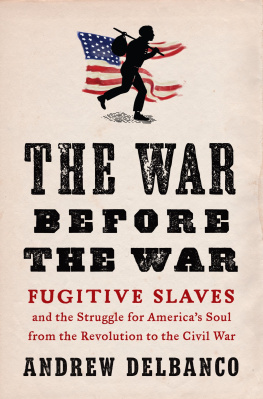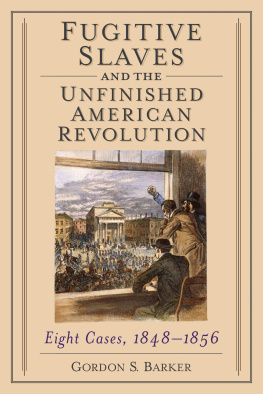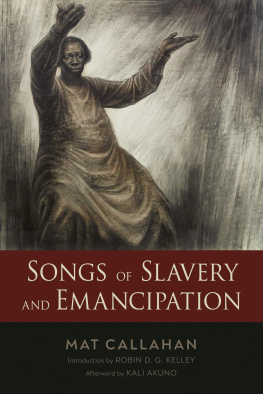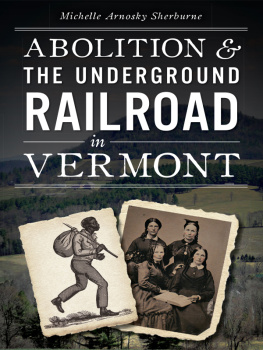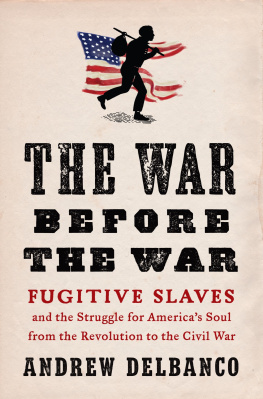The great value of Andrew Delbancos interpretively edifying The War Before the War is in centering the cause of the great irrepressible conflict of 1860 in the many hearts and minds of otherwise indifferent, sympathetic, uncertain northern men and women who finally found enforced complicity in the Souths peculiar institution intolerable and a war for human ideals inescapable.
David Levering Lewis , Pulitzer Prizewinning author of W. E. B. Du Bois: A Biography
Timely, incisive, deeply researched, The War Before the War tells the vital story of fugitive slaves, whose courageous defiance forced the young nation to reckon with its primal horror. Delbancos swift-moving yet powerfully nuanced narrative offers insights into the institution of slavery and the political maneuvering that led up to the Civil War. This book is essential reading today, at a historical moment that demands unflinching reflection on founding truths.
Elizabeth D. Samet, author of Soldiers Heart and editor of The Annotated Memoirs of Ulysses S. Grant
In The War Before the War, one of Americas most eloquent scholars draws readers into the compelling story of how the North-South struggle over runaway slaves prepared the way for the Civil War. From the making of the Constitution to the bloodbath that began at Fort Sumter, Andrew Delbanco captures the experience of escaped slaves as they forced white Americans to confront the cruelties of slavery. This is a political, legal, and, above all, human story with powerful resonance today.
Dan T. Carter, author of Scottsboro: A Tragedy of the American South
BY ANDREW DELBANCO
College: What It Was, Is, and Should Be
Melville: His World and Work
The Real American Dream
Required Reading: Why Our American Classics Matter Now
The Death of Satan
The Puritan Ordeal
William Ellery Channing
PENGUIN PRESS
An imprint of Penguin Random House LLC
penguinrandomhouse.com
Copyright 2018 by Andrew Delbanco
Penguin supports copyright. Copyright fuels creativity, encourages diverse voices, promotes free speech, and creates a vibrant culture. Thank you for buying an authorized edition of this book and for complying with copyright laws by not reproducing, scanning, or distributing any part of it in any form without permission. You are supporting writers and allowing Penguin to continue to publish books for every reader.
Photograph and art credits appear on .
ISBN: 9781594204050 (hardcover)
ISBN: 9780525560302 (ebook)
Version_1
To Ben and Raina, Yvonne and Emilia, and, always,
for Dawn
To love and live beloved is the souls paradise
INTRODUCTION
I N N OVEMBER 1863, Abraham Lincoln went to Gettysburg, Pennsylvania, to honor the thousands of men and boys who had died there four months before. In what became the most famous speech in American history, he consecrated the battlefield in the name of a nation conceived in liberty, and dedicated to the proposition that all men are created equal. For most Americans, and for much of the world, those words have attained the status of scripture. They were, however, not strictly true, and Lincoln knew it.
Five years earlier, he had been more candid. Speaking in Chicago in the summer of 1858, he noted that when the Republic was founded, we had slavery among us, and that we could not get our constitution unless we permitted slavery to persist in those parts of the nation where it was already entrenched. We could not secure the good we did secure, he said, if we grasped for more. The United States, in other words, could not have been created if the eradication of slavery had been a condition of its creation. Had Lincoln said at Gettysburg that the nation was conceived not in liberty but in compromise, the phrase would have been less memorable but more accurate.
The hard truth is that the United States was founded in an act of accommodation between two fundamentally different societies. As one southern-born antislavery activist later wrote, it was a sad satire to call [the] States United, because in one-half of the country slavery was basic to its way of life while in the other it was fading or already gone. The founding fathers tried to stitch these two nations together with no idea how long the stitching would hold.
For nearly a century, the two halves of the so-called United States coexisted relatively peacefully. In its early decades, the young republic was little more than a business consortium dependent on interstate trade and central financing for infrastructure improvements. Countless transactions took place between North and South without incident. Southern planters supplied northern textile mills with slave-grown cotton, while northern banks supplied southern planters with financial capital. Inhabitants of one section regularly crossed over into the other. The sight of white southerners with their black maids or valets was common in the streets of northern cities and towns.
This book tells the story of how that composite nation came apart. There were many reasons for the unraveling, but one in particular exposed the idea of the united states as a lie. This was the fact that enslaved black people, against long odds, repeatedly risked their lives to flee their masters in the South in search of freedom in the North. Fugitives from slavery ripped open the screen behind which America tried to conceal the reality of life for black Americans, most of whom lived in the South, out of sight and out of mind for most people in the North. Fugitive slaves exposed the contradiction between the myth that slavery was a benign institution and the reality that a nation putatively based on the principle of human equality was actually a prison house in which millions of Americans had virtually no rights at all. By awakening northerners to this grim fact, and by enraging southerners who demanded the return of their absconded property, fugitive slaves pushed the nation toward confronting the truth about itself. They incited conflict in the streets, the courts, the press, the halls of Congress, and perhaps most important in the minds and hearts of Americans who had been oblivious to their plight. This manifold conflictunder way long before the first shots were fired in the Civil Warwas the war before the war.
T HE PROBLEM OF FUGITIVE slaves loomed over the Republic from the start. Many of the founding fathers were slave owners themselves, including Thomas Jefferson and George Washington, whose own slaves periodically ran away. The founders made an effort to solve the problem in Article 4, Section 2, Clause 3 of the Constitution, which came to be known (although it referred to indentured servants as well as to slaves) as the fugitive slave clause:
No Person held to Service or Labour in one State, under the Laws thereof, escaping into another, shall, in Consequence of any Law or Regulation therein, be discharged from such Service or Labour, but shall be delivered up on Claim of the Party to whom such Service or Labour may be due.
But stating this principle proved to be much easier than carrying it out. Although from the southern point of view, law-abiding citizens were obliged to return a runaway slave just as if they had come upon stray cattle or stolen cash, the fugitive slave clause was erratically enforced. For the most part, slavery was left to the jurisdiction of the states. In 1793, Congress passed a law that tried to strengthen the constitutional requirement, but the federal government remained too weak to enforce it. Over the ensuing decades, northern states adopted personal liberty laws that put up further barriers to enforcement, including laws guaranteeing jury trials for accused fugitives and prohibiting state officials from assisting in returning them to the South.

